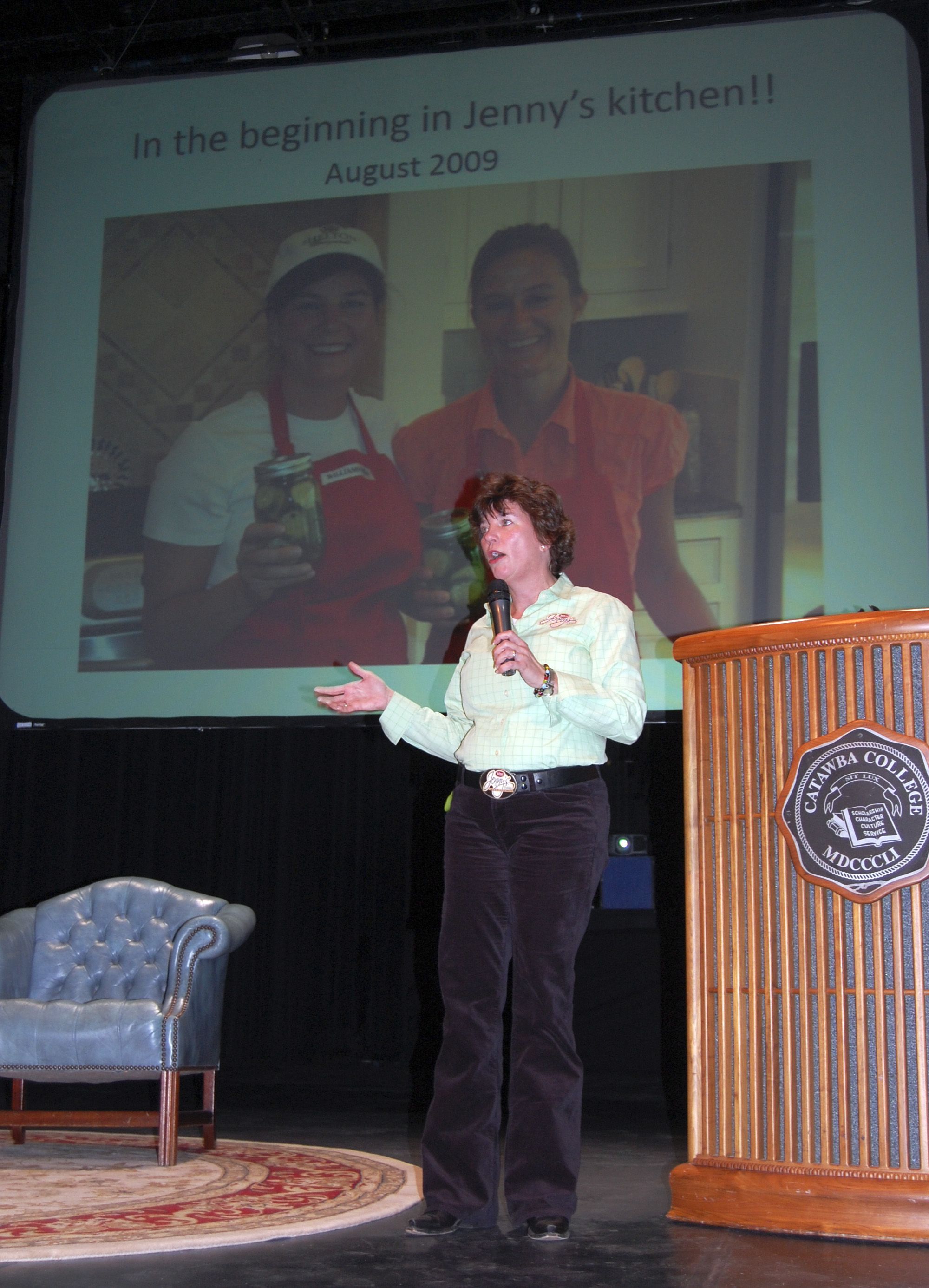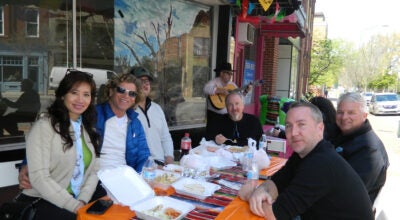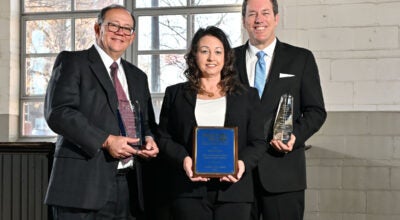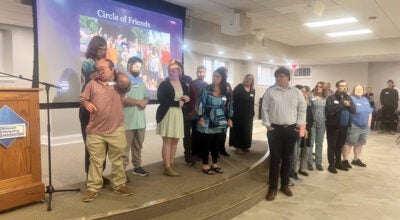Miss Jenny talks pickles at Catawba
Published 12:00 am Sunday, April 20, 2014
SALISBURY — Jenny Fulton puts her cell phone number on every jar of Miss Jenny’s Pickles, and it’s not just for show.
An elderly woman called the number recently, and Fulton answered with her customary, “Jenny Fulton, how can I help you?”
The woman said she had a problem with Fulton’s gourmet pickles, made in Kernersville since 2010 and now available in more than 1,700 stores including Harris Teeter in Salisbury. The hungry 85-year-old could not open her jar of bread and butters.
Fulton wrote down the woman’s High Point address and called her business partner, Ashlee Furr, who happened to be in Greensboro. Furr, who is the niece of Bob and Peggy Wilson of Salisbury, drove to the woman’s house, knocked on the door and opened the stubborn jar.
The service call was more than just a good deed. It was a business decision.
“Do you not think I have a customer for life?” Fulton said.
Fulton’s commitment to customer service and enthusiasm for her product are hallmarks of her homegrown success story, which she shared Thursday at Catawba College’s annual Distinguished CEO Lecture. With an entertaining mix of expertise, humor and genuine awe that pickles (“Pickles, y’all!”) have put her on Good Morning America and 60 Minutes, at the Great Wall of China and in front of Congress, Fulton displayed her business acumen and encouraged budding entrepreneurs to “go for it.”
“You can do anything,” she said. “Oh Lord, if I can do this with pickles, you can do anything.”
From humble beginnings, Fulton overcame the odds. Her grandmother raised her after her father died while she was very young. Under Mamie’s tutelage, Fulton learned to grow cucumbers in the field next to her grandmother’s home and to turn them into pickles.
By age 18, Fulton was paying her own power bill and working full-time while attending night classes on scholarship at Winston-Salem State University. After starting as a bank secretary, Fulton transferred to the investment department and eventually earned a stockbroker’s license. She was named a branch manager and worked for 16 years in the financial industry with Furr.
When the economy tanked in 2009, the women lost their jobs. Fulton, a country girl from Forsyth County, and Furr, a city girl from Atlanta, reinvented their careers. They went to Pickle School, or the Acidified Foods Processing and Packaging Better Process School, at N.C. State University to learn commercial food preparation.
“So we didn’t kill people,” Fulton said.
They launched Miss Jenny’s Pickles in 2010 after Fulton won the coin toss to determine whose first name would grace the label. For two summers, Furr and Fulton worked 10-hour days growing, harvesting and pickling cucumbers. They each invested about $2,500 in the business and to this day have only spent about $700 on advertising.
Using Mamie’s old-fashioned pickle recipes, the women started their company in Fulton’s church kitchen but quickly outgrew the space and convinced the Winston Lake YMCA to let them use the commercial kitchen.
They never really completed the business plan because the company took off so quickly.
At the end of 2010, Miss Jenny’s Pickles were in 50 stores. By 2011, they were in 250 stores and had started exporting to China. By 2012, 900 stores were carrying Miss Jenny’s Pickles, and the awards started rolling in, both professionally in the food industry and personally for work in the community.
“Pickles are my passion,” Fulton said, striding across the stage at Catawba in cowboy boots, black jeans and a gigantic Miss Jenny’s belt buckle. “I loved them before I started the company and love them even more today.”
Fulton attributes the company’s success to three things: people, process and product. With a contagious enthusiasm, Fulton said entrepreneurs can improve their process and product, but they need to have the right people from the start.
Without Furr by her side, the pickle idea would have soured, Fulton said.
“She’s the best partner I could ever find,” Fulton said. “I’m the gas, she’s the brakes.”
Fulton is the visionary, and Furr is detail-oriented. Fulton grew up in a rural environment, while Furr had never pickled a cucumber, much less anything else, in her life. While opposites in many ways, both women “poured our heart and soul into making pickles,” Fulton said.
By 2013, the success of Miss Jenny’s Pickles had attracted political attention. Fulton was invited to testify in front of a congressional subcommittee about exporting and small businesses and later returned to Washington to introduce Vice President Joe Biden at the Ex-Im Bank Conference.
Fulton laughed about her five-minute introduction, during which she forgot to tell 1,200 people to sit down and handed the podium over to Biden saying, “Good luck.” A video of the introduction is on YouTube.
Fulton bestowed several pieces of advise on the budding entrepreneurs at Catawba. Never, ever trust your family and friends for an honest opinion. Fulton and Furr depended on taste testing by random strangers to tweak their four varieties — signature salt and pepper, jalapeno salt and pepper, traditional bread and butter and the award-winning habanero bread and butter.
The women have encountered challenges and obstacles along the way.
“It ain’t all rosy in the pickle world,” Fulton said. “… When you come up to a wall and you think you can’t solve a problem, step back and think because you can.”
Fulton said they needed a commercial, but the film crew they wanted to hire was going to charge $4,000. That was more than the business had in the bank at the time. Fulton discovered the film company had a few graduate students on staff, but they were specializing in horror movies.
“Don’t you need to diversify that portfolio?” she asked.
They made the Miss Jenny’s commercial for $400.
Build your brand, Fulton advised, and anytime you have the opportunity to promote your product, do it. Fulton lined up jars of pickles in front of the microphone when she testified before the congressional subcommittee.
She wears green during public appearances because “when you look at me, I want you to think pickles.” She never asks someone if they want to try a pickle. Instead, she says, “Do you want to try a Miss Jenny’s pickle?”
Starting a business is 70 percent guts and 30 percent ideas, Fulton said, and failure is inevitable. Miss Jenny’s lost money during an ill-fated attempt to transport frozen pickles.
“When I fail, I really learn something,” she said. “You’re not going to be successful unless you do fail.”
So far, Miss Jenny’s has failed to land a deal with Food Lion, the Salisbury-based grocery stores chain with more than 1,100 locations. Food Lion co-founder Ralph Ketner attended Fulton’s lecture, which was presented by the Catawba school of business named in his honor.
Fulton has not given up on putting her pickles in Salisbury’s hometown grocer.
“We working on Food Lion,” she said. “We’re going to get there too.”
Contact reporter Emily Ford at 704-797-4264.






